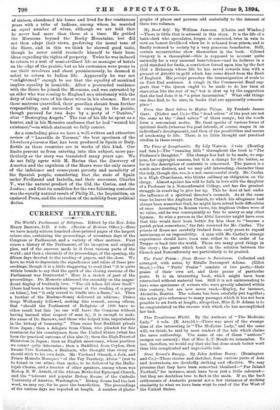CURRENT LITERATURE.
The World's Parliament of Religions. Edited by the Rev. John Henry Barrows, D.D. 2 vols. (Review of Reviews Office.)—Here we have nearly sixteen hundred close-printed pages of the largest octavo size, containing the proceedings of seventeen days of the Congress or Parliament, and a -variety of other matters. First comes a history of the Parliament, of its inception and original plan, and of the answers made to it from various parts of the world ; and then a chronicle of its proceedings, of the opening, the fifteen days devoted to the reading of papers, and the dose. We have no wish to depreciate the significance and value of these pro- ceedings, though it is a little staggering to read that "it is quite within bounds to say that the spirit of the closing sessions of the Parliament was Pentecostal" Here is a sketch of part of the proceedings. Dr. Momerie addressed the assembly on the magni- ficent display of brotherly love. "The old Adam did show itself" [there had been a tremendous uproar at the reading of a paper on Islam], but "it only served to kindle into a flame," &c. Then a brother of the Brahmo-Somaj delivered an address; Prince Serge Wollonsky followed, making this remark, among others, that "should the Parliament of Religions of 1893 have no other result but this [no one will leave the Congress without having learned what respect of man is], it is enough to make the name of Dr. Barrows, and those who helped him, imperishable in the history of humanity." Then came four Buddhist priests from Japan ; then a delegate from China, who pleaded for fair treatment for his countrymen from the United States (what has been the practical outcome of this also I) ; then the High Priest of Shintoism in Japan; then an English missionary, whose position we cannot quite determine ; then a Buddhist from Ceylon, then Swami Vive Kananda, a Brahmin, who thought that every one should stick to his own faith. Mr. Virchand Ghandi, a Jain, and Prince Momuk Masaquoi " of the Vey Territory, Africa" (not to be found in our atlas), then spoke, to be followed by the Halle- lujah Chorus, and a number of other speakers, among whom was Bishop B. W. Arnett, of the African Methodist Episcopal Church, and the "tolerant and popular Bishop Keane. of the Catholic University of America, Washington." Bishop Keane had the last word, we may say, for he gave the benediction. The proceedings of the various days are reported at length. A number of photo-
graphs of places and persons add materially to the interest of these two volumes.






































 Previous page
Previous page